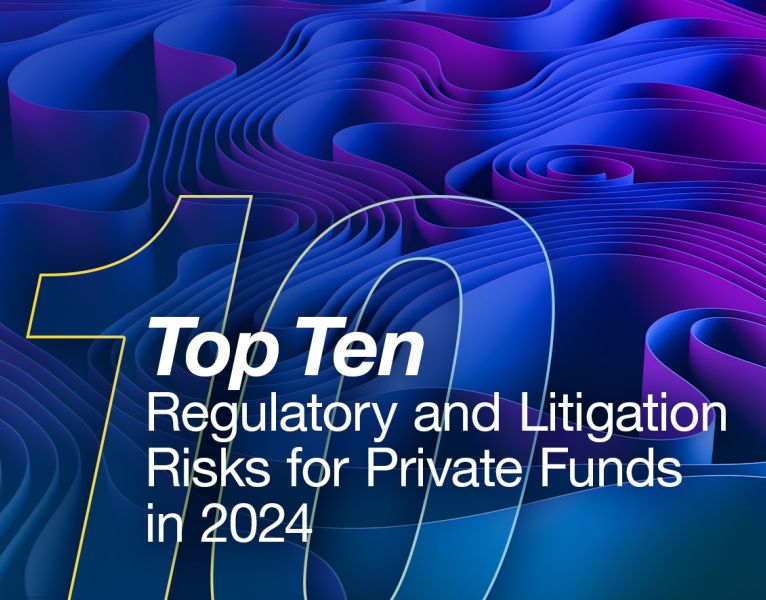In a wave of SEC rulemaking this past year, representing a “new world order” event akin to Dodd-Frank, the SEC has provided itself with a fresh set of tools to increase regulatory and enforcement scrutiny on private funds. Among other things, certain of the rules could result in fundamental changes to market practices and greater disclosure to LPs. While ongoing litigation will determine the fates of the Private Fund Adviser Rules, the Short Sale Disclosure Rule, and the Securities Lending Rule, and while other rules are awaiting final adoption, the SEC concerns underlying the rulemaking will continue regardless.
In fact, many of the new rules concern longstanding focus areas of Exams and Enforcement, including what the SEC has identified as problematic practices by private fund advisers arising from conflicts of interest, insufficient transparency, and a lack of effective governance mechanisms. The SEC’s Enforcement Director noted earlier in 2023 that private funds were a “substantive priority area” for the division, and last year the SEC brought a number of cases relating to these core issues. However, many of the rules give the SEC new requirements to examine and new devices with which to investigate them, and advisers face far more opportunities for “foot faults” in failing to comply with the new rules or to adopt reasonably designed compliance policies. The new rules impose many new obligations and introduce new restrictions that are likely to significantly alter business practices, and impose new administrative burdens and costs, across many registered and exempt private fund advisers.
While compliance dates stretch into the future, increased scrutiny in these areas is already happening (pre-compliance dates). Given the pending industry legal challenges to the scope of the new rules and claims of SEC overreach, the SEC staff is under pressure to look for examples of conduct that justify the rulemaking. Even if the scope of the new rules is scaled back because of legal challenges, these areas will continue to be a focus of future examinations and investigations.
Many of the new rules require advisers to provide greater disclosure of market practices to the SEC. These rule changes provide the SEC with enhanced tools to assess systemic risk and monitor market trends, and will inform future examinations, enforcement investigations and targeting of risk areas.
Certain notable rules that have been adopted to date, chronologically:
| Adopted Rule | Compliance Date |
|---|---|
| The Marketing Rule | Mandatory as of November 4, 2022. |
| Form PF Reporting Rules | Partially effective and mandatory as of December 11, 2023, with certain compliance dates in 2024. |
| *Private Fund Adviser Rules | Effective as of November 13, 2023; compliance dates vary. |
| Amendments to Section 13(d) and 13(g) Reporting Rule | Adopted October 10, 2023; compliance dates vary. |
| *Short Sale Disclosure Rule | Adopted October 13, 2023; compliance dates vary. |
*These rules are presently being challenged in the Fifth Circuit.
| Proposed Rule | Initial Proposal Date |
|---|---|
| Cybersecurity Rule | February 9, 2022 |
| ESG Reporting and Disclosure Requirements | May 25, 2022 |
| Outsourcing Rule | October 26, 2022 |
| Safeguarding Rule | Proposed February 15, 2023; comment period reopened August 23, 2023 |
| Amendments to Regulation S-P | March 15, 2023 |
| Conflicts of Interest and Predictive Data Analytics Rule | July 26, 2023 |
The SEC exam/enforcement approach is likely to mirror what we have already seen with respect to the new Marketing Rule, which went into effect in 2022:
- Last year, SEC examinations focused on basic compliance with the rule, including: changes to policies and procedures and any new employee training in response to the rule, review and approval process for marketing materials, substantiation of material facts (and related back-up) and compliance with the rule’s requirements with respect to performance advertising, testimonials and endorsements and third-party ratings.
- In September 2023, the SEC announced the results of an enforcement sweep focused on the Marketing Rule and its limitations on advertising hypothetical performance, leading to settled orders against nine registered investment advisers, all involving the use of hypothetical investment performance that was published on the advisers’ public websites rather than to a particular intended audience.
It remains to be seen what will happen with respect to the other rules, some of whose effective dates are quickly approaching. But based on SEC activity after the Marketing Rule’s compliance date, it seems likely that each of the new rules will bring about more regulatory enforcement actions. And due to the lack of precedent in applying certain aspects of the new rules, it may take time to iron out the interpretation of specific provisions. Fund manager practices and documentation will likely need to be examined before the rules’ varying compliance dates with this uncertainty in mind, changing practices as needed in response to the SEC’s application of these new rules in exams and enforcement.
Read more of our Top Ten Regulatory and Litigation Risks for Private Funds in 2024.


